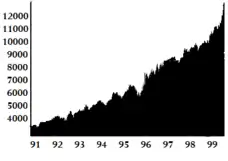The 1990s PortalThe 1990s (pronounced "nineteen-nineties"; shortened to "the '90s") was a decade of the Gregorian calendar that began on 1 January 1990, and ended on 31 December 1999. Culturally, the 1990s are characterized by the rise of multiculturalism and alternative media, which continues into the present day. Movements such as hip hop, the rave scene and grunge spread around the world to young people during that decade, aided by then-new technology such as cable television and the World Wide Web. In the absence of world communism, which collapsed in the first two years of the decade, the 1990s was politically defined by a movement towards the right-wing, including increase in support for far-right parties in Europe[1] as well as the advent of the Hindu nationalist Bharatiya Janata Party[2] and cuts in social spending in the United States,[3] Canada,[4] New Zealand,[5] and the UK.[6] The United States also saw a massive revival in the use of the death penalty in the 1990s, which reversed in the early 21st century.[7] During the 1990s the character of the European Union and Euro were formed and codified in treaties. A combination of factors, including the continued mass mobilization of capital markets through neo-liberalism, the thawing of the decades-long Cold War, the beginning of the widespread proliferation of new media such as the Internet from the middle of the decade onwards, increasing skepticism towards government, and the dissolution of the Soviet Union led to a realignment and reconsolidation of economic and political power across the world and within countries. The dot-com bubble of 1997–2000 brought wealth to some entrepreneurs before its crash between 2000 and 2001. The 1990s saw extreme advances in technology, with the World Wide Web, the first gene therapy trial, and the first designer babies[8] all emerging in 1990 and being improved and built upon throughout the decade. New ethnic conflicts emerged in Africa, the Balkans, and the Caucasus, the former two which led to the Rwandan and Bosnian genocides, respectively. Signs of any resolution of tensions between Israel and the Arab world remained elusive despite the progress of the Oslo Accords, though The Troubles in Northern Ireland came to a standstill in 1998 with the Good Friday Agreement after 30 years of violence.[9] Selected article -Boyz II Men (pronounced boys to men) is an American vocal harmony group from Philadelphia, Pennsylvania, best known for emotional ballads and a cappella harmonies. They are currently a trio composed of baritone Nathan Morris alongside tenors Wanyá Morris and Shawn Stockman. During the 1990s, Boyz II Men were a quartet, including bass singer Michael McCary, who left the group in 2003 due to health issues that were eventually diagnosed as multiple sclerosis. The group gained international success in 1991, beginning with the release of top 5 singles "Motownphilly" and "It's So Hard to Say Goodbye to Yesterday." Their number one single "End of the Road" was released in 1992, and topped music charts across the globe. "End of the Road" set a new record for longevity, holding the number one spot on Billboard Hot 100 for thirteen weeks. Boyz II Men broke this record with the subsequent releases of "I'll Make Love to You" and "One Sweet Day" (with Mariah Carey), which, at fourteen and sixteen weeks, respectively, each set new records for the total number of weeks at number one. "I'll Make Love to You" topped the charts in Australia for four weeks and garnered international success. When "On Bended Knee" took the number one spot away from "I'll Make Love to You", Boyz II Men became only the third artists ever (after the Beatles and Presley) to replace themselves at the top of the Billboard Hot 100. These achievements were enough to earn Boyz II Men recognition as Billboard magazine's biggest boy band during the period of 1987 to 2012. Boyz II Men has received four Grammy Awards. (Full article...)Did you know (auto-generated) -
Selected pictureList articlesCategory puzzle Select [►] to view subcategories
1990s-related lists 1990-related lists 1991-related lists 1992-related lists 1993-related lists 1994-related lists 1995-related lists 1996-related lists 1997-related lists 1998-related lists 1999-related lists Lists of 1990s ballet premieres Lists of 1990s films 1990s politics-related lists 1990s record charts 1990s television-related lists Selected biography -Eilleen Regina "Shania" Twain OC (/aɪˈliːn ... ʃəˈnaɪə/ eye-LEEN ... shə-NY-ə; née Edwards; born August 28, 1965) is a Canadian singer-songwriter. She has sold over 100 million records, making her one of the best-selling music artists of all time and the best-selling female artist in country music history. Her success garnered her several titles, including the "Queen of Country Pop". Billboard named her as the leader of the '90s country-pop crossover stars. Raised in Timmins, Ontario, Twain pursued singing and songwriting from a young age before signing with Mercury Nashville Records in the early 1990s. Her self-titled debut studio album was a commercial failure upon release in 1993. After collaborating with producer and later husband Robert John "Mutt" Lange, she rose to fame with her second studio album, The Woman in Me (1995), which brought her widespread success. It sold over 20 million copies worldwide, spawned eight singles, including "Any Man of Mine" and earned her a Grammy Award. Twain's third studio album, Come On Over (1997), is recognized by Guinness World Records as the biggest-selling studio album by a female solo artist. It also became the best-selling country album, best-selling album by a Canadian, and one of the world's best-selling albums of all time, selling over 40 million copies worldwide. Come On Over produced twelve singles, including "You're Still the One", "From This Moment On", "That Don't Impress Me Much" and "Man! I Feel Like a Woman!" and earned her four Grammy Awards. Her fourth studio album, Up! (2002), spawned eight singles, including "I'm Gonna Getcha Good!", "Ka-Ching!" and "Forever and for Always", selling over 20 million copies worldwide, also being certified Diamond in the United States. (Full article...)General images -The following are images from various 1990s-related articles on Wikipedia.
|
 |
You are invited to participate in WikiProject Years, a WikiProject dedicated to developing and improving articles about years, decades, centuries, and millennia. |
Associated Wikimedia
The following Wikimedia Foundation sister projects provide more on this subject:
-
 Commons
Commons
Free media repository -
 Wikibooks
Wikibooks
Free textbooks and manuals -
 Wikidata
Wikidata
Free knowledge base -
 Wikinews
Wikinews
Free-content news -
 Wikiquote
Wikiquote
Collection of quotations -
 Wikisource
Wikisource
Free-content library -
 Wikiversity
Wikiversity
Free learning tools -
 Wiktionary
Wiktionary
Dictionary and thesaurus
Sources
- ↑ Merkl, Peter; Leonard, Weinberg (2 August 2004). Right-wing Extremism in the Twenty-first Century. Routledge. ISBN 978-1-135-76421-0.
- ↑ "India – The Bharatiya Janata Party and the Rise of Hindu Nationalism".
- ↑ ROSEN, RUTH (27 December 1994). "Which of Us Isn't Taking 'Welfare'? : Poor children rank low in government largess; why is the comfortable class so mean?". Los Angeles Times.
- ↑ Séguin, Gilles. "Provincial Welfare Reforms in the 1990s – Canadian Social Research Links".
- ↑ Maloney, Tim (1 May 2002). "Welfare Reform and Unemployment in New Zealand". Economica. 69 (274): 273–293. doi:10.1111/1468-0335.00283.
- ↑ "Policy Exchange – Shaping the Policy Agenda" (PDF). Archived from the original (PDF) on 21 January 2014.
- ↑ https://www.usnews.com/news/articles/2013/12/19/report-us-executions-dipped-in-2013
- ↑ Handyside, AH; Kontogianni, EH; Hardy, K; Winston, RM (1990). "Pregnancies from biopsied human preimplantation embryos sexed by Y-specific DNA amplification". Nature. 344 (6268): 768–70. Bibcode:1990Natur.344..768H. doi:10.1038/344768a0. PMID 2330030.
- ↑ Stiglitz, Joseph E. (2004). The Roaring Nineties. W. W. Norton. ISBN 978-0-393-32618-5.
-
 List of all portals
List of all portals -

-

-

-

-

-

-

-

-

-
 Random portal
Random portal -
 WikiProject Portals
WikiProject Portals
.jpg.webp)




.jpg.webp)


.jpg.webp)




.jpg.webp)








%252C_woman's_costume%252C_1990s_-_Bunka_Gakuen_Costume_Museum_-_DSC05303.JPG.webp)


_(cropped).jpg.webp)


.jpg.webp)


.jpg.webp)




.JPG.webp)














_(5).jpg.webp)






.png.webp)






.jpg.webp)





.jpg.webp)






























_cropped.jpg.webp)







.jpg.webp)












.jpg.webp)


.JPG.webp)




